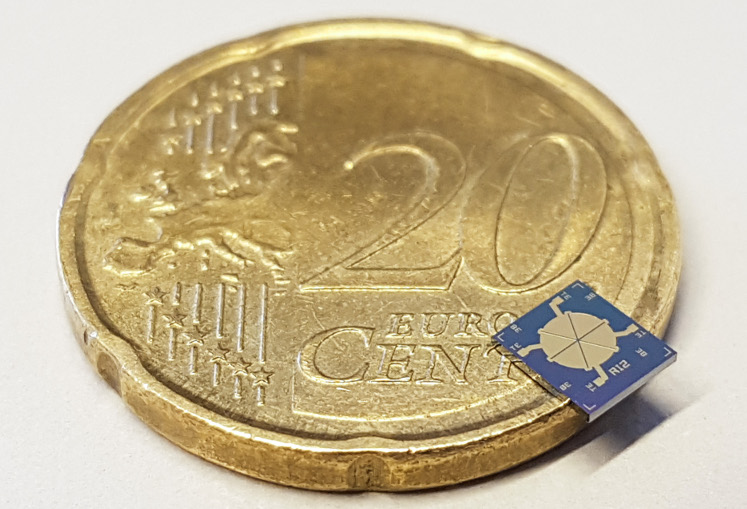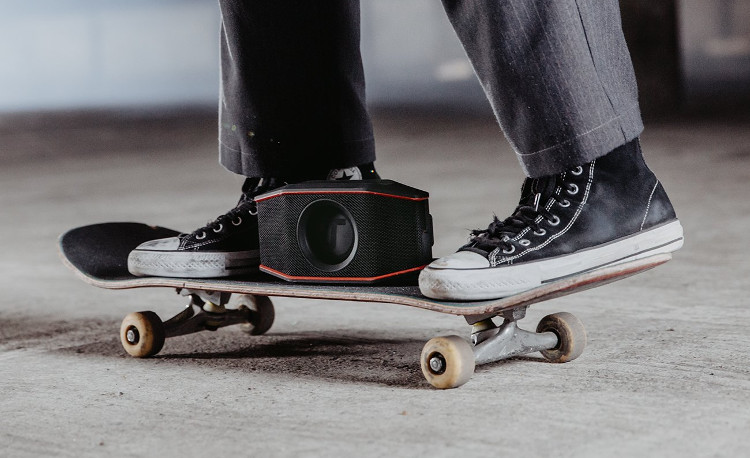In the second article of our #FutureSound series we are discussing the miniaturisation of loudspeakers. This is likely to progress in the future, which could open up completely new areas of speaker use. In Vienna, inventors have even managed to pack image data into vinyl grooves – you can’t get full HD with it, but it’s still an exciting innovation.
News from the Fraunhofer Institute
When the Fraunhofer Institute announces a novelty in the field of audio, you should pay attention. Most recently, they made a significant contribution to the development of the mp3 format. In Spring 2018, Fraunhofer researchers presented the world’s smallest loudspeaker. The square micro speaker measures only 4 x 4 mm! You might think that such a tiny speaker would sound anything but good. But apparently the opposite is the case! It can reach volumes of 110 decibels while reproducing the frequency range of 20 to 20,000 Hertz audible to humans, and with an absolutely linear frequency responseOpens in new tab.

These speakers function completely differently from conventional electrodynamic loudspeakers, which are currently used in in-ear speakers as well as in floor-standing loudspeakers. Like computer chips, MEMS loudspeakers (micro-electro-mechanical systems) are made from silicone and are manufactured using a similar process. The decisive difference is that the micro-loudspeakers are movable, so that a membrane can stimulate the surrounding air by mechanical deflection. This creates sound waves.
With the successful integration of such a MEMS loudspeaker into in-ear headphones, Fraunhofer researcher Daniel Beer sees a paradigm shift in loudspeaker construction. However, it remains to be seen whether it will be possible to use similarly small speakers to provide sound in rooms. Physically, there are major hurdles to overcome. In principle, however, there are of course many possibilities for such small sound converters – for example in smartphones, tablets or furnishings. We are taking a close look at how the chip speakers will develop.
Teufel headphones, in-, on- or over-ear
[product id=”24200,30484,26973″]
A headset for your….teeth?
Maybe braces will soon become popular and trendy after all. In the USA, a company has developed a kind of headset that can be attached to molars in the mouth. It is equipped with a microphone and can also be used to listen to transmitted audio data. From an acoustic point of view, the sound transmission process is what is really spectacular about this invention. The sound is actually transmitted to the inner ear via the vibrations of the teeth, jaws and skull bones. To transmit the microphone information, you also have to wear a collar that transmits the data via Bluetooth to a terminal device.
You could think this tooth set was invented just for fun – if the US military hadn’t helped finance the project. The decisive advantage of the device is the suppression of ambient noise. The mouth itself serves as a noise cancelling device, so to speak. This makes it easier to understand when there is noise in the helicopter or in combat operations, for example. In everyday life, on the other hand, it could seem rather strange if someone were to (apparently) begin speaking to themself and then spit out a piece of plastic.
Analogue charm – Pictures from vinyl grooves
Image data on records – at first it sounds absurd. But that has not prevented the Viennese agency Supersense from developing a procedure with which both audio and video data can be stored and played back in the grooves of a record. The project goes back to the artist Gebhard Sengmüller. Together with the sound technician and physicist Martin Diamant, he built two prototypes for the reproduction of video vinyl years ago. For the current implementation, the Viennese agency has built a converter that can be bought for €178. It works with standard turntables (with a diamond needle) and televisions. With this method, eight frames per second and mono sound can be reproduced.
In collaboration with the band The Courettes and the Hamburg indie label Voodoo Doll, the Bremen filmmakers from Crowdmotions have produced a song and a video especially for the audiovisual vinyl record.
Future sound at Teufel

These Teufel innovations will soon be available:
- ▶ ROCKSTER GOOpens in new tab: Whether you are racing downhill on a mountain bike or cutting halfpipes at a skating rally – with the ROCKSTER GO you can give unforgettable moments the right kick with your favourite music. Thanks to its rubberised body and waterproof (IPX7) construction, you can take it with you wherever you go.
- ▶ AIRYOpens in new tab: We have given our AIRY a new lick of paint. The Bluetooth headset is now available in black and white. We have also slightly modified the design of the ear cups and temples. In addition, the integrated battery is even more durable; it is now possible to get up to 30 hours play time (previously 20), and a Bluetooth range of 12 metres.
Stereo sound for audio enthusiasts
[product id=”26075,33025,31012″]
#FutureSound II – An overview
- The Fraunhofer Institute has presented a loudspeaker that measures only 4 x 4 millimeters and can reach 110 decibels.
- A US company, financed by the military, has developed a headset that directs sound to the ear via teeth and jaws.
- An Austrian agency has devised a method for storing image data in vinyl grooves.
Photo 1: © Fraunhofer Institute for Silicone Technology – ISIT





Leave a Reply